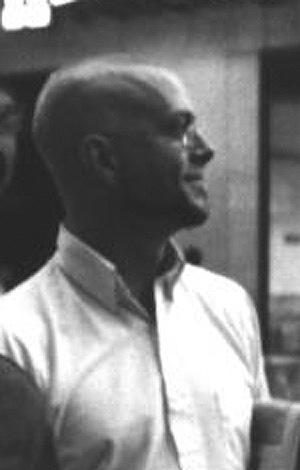The Column: The First and Last Frontier
Christian McShane, our fourth columnist, will write on music and musicians in the northern part of the state. He joins Michael Fallon, Andrew Knighton, and Dean Seal. This is his meditation on the origins of music and its continuing invention.

The sky is vast.
A man sits on an old log, looking up at the clouds. No animal has crossed his path for hours as the sun stretches nearly straight above his head. His stomach growls. He’s baited the trap, but there’s nothing. Nothing but the wind. He listens as the sound envelops his ears and curls around his head. A stronger gust of wind picks up a handful of dirt and sprays it into his eyes. Frustrated, he
picks up the nearest object, a bone from last night’s meal, and hits the
log he’s sitting on. “Whunk!”
Well, that was interesting.
He hits the log again, harder this time. Whack! And again and again
and again. Whack, whunk, whunk!
A man just invented a drum. A three-toothed grin spreads across his face.
Many thousands of years later a deaf man violently pounds keys connected to
small bundles of felt that hammer strings – desperately trying to feel
the vibrations. Attacking a fortepiano in this manner is unspeakable.
Beethoven composes “Jesus, Joy of Man’s Desiring.”
Later still, a young Russian, Levi Termin, discovers that when
he waves his hand between two charged electrical coils connected to a
speaker, a sound is produced. He has no idea that thirty or so years later
he will inspire Robert Moog to create the first electronic keyboard.
About the time that Moog creates his first prototype, a girl in Iceland
starts singing and playing with bizarre sounds: Bjork. Another girl
trains her voice to reach unspeakable heights and emotion: Diamanda
Galas.
And in 2003, a young person will go to a first pop concert and will learn that music has nothing to do with being talented or creative, but instead depends on proper product placement.
Perhaps it’s true what Bono said (the Bono of U2, before they too became product): “In the ‘80s, rock and roll got up at 6 am and went jogging.” The same could be said of the state of music in general. Corporate blues, classical, jazz, r&b, rock, and even punk are all just that – corporate. Rap, hip hop and scratch
dj used to be interesting until the industry found a way to water them down, market them and make millions. It’s Twinkie music for the masses, and
just about as fulfilling as that ubiquitious pastry’s unnatural creamy center.
So where are the new Penderickis, Zappas, Miles Davises, Brian Enos,
Marleys, Lennons and Leadbellys? Where’s the passion, the
evolution, the movers and shakers, the inspirers, the envelope pushers?
In the woodwork. Under your floor. Suppressed, but not gone. Just a lot
harder to find than J-Lo.
While high-rise record labels have been busy finding ways to pick your wallet, musicians in the tradition of music made by people have been busy experimenting and creating. But everything that’s possible musically has already been done, right? Wrong.
Our boundaries for sound are limitless. Experimenting with sound and
finding new ways to express that experimentation is only limited by
imagination. And encouragement. And support. And accessibility to what
seems inaccessible by way of recorded or performed music. But the real thing is out there, trust me, you really ought to seek it out and take a listen.
Radiohead, the only current large-scale, major-label band I’m aware of
that fully utilizes experimentation and innovation, is an exception that
thankfully rose to the surface. Beck is another that comes to mind. But
there’s so much more out there, outside, where these two began. It’s there with
the independent musicians that strive for the uncharted because they
have nothing to lose and no platinum sales to please.
Beck and Radiohead are proof that the public is hungry for innovators and experimenters, even though major labels are apparently deaf to the wake-up call. Major-label sales have been down for years, though independent sales are up. Blame the post-9/11 economy if you want. I personally blame major labels for
continuously force-feeding us crappy music for far too long. Is it
really human to embrace what’s unchanged, rehashed and repackaged?
Corporate America enthusiastically says yes. A growing number of people with ears are saying no.
It’s human nature to create and explore—today’s music is the result of such exploration, layers and layers of it. Tomorrow’s musical innovators and experimenters need our support. They are the future of music, not some media conglomerate. Music is far too important to us humans to be taken for granted and pumped out of a machine like widgets.
The sky is still vast.